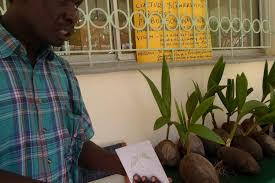Strengthen biocultural innovations for food security
Lazarus Sauti
Collence Chisita, a Harare
based knowledge management expert believes that strengthening biocultural
innovation is good for the African continent.
He said biocultural
innovations are part of the African heritage and biocultural knowledge is
critical in supporting food security in the face of climate change.
“Biocultural innovations
are part of heritage and they encompass to the knowledge and practices of
indigenous people and their biological resources, from the genetic varieties of
crops they develop, to the landscapes they create.
“As indigenous peoples
have adapted to harsh climates over many generations, bio-cultural knowledge or
intellectual capital is critical in supporting food security in the face of
climate change and impact of vagaries of nature like drought,” he said.
Chisita therefore urged
countries within and across the African continent to revitalise biocultural innovation
systems of smallholder farmers to strengthen food security in the face of
climate change.
“Biocultural innovation
- new kind of innovation - is needed for food and nutrition security in countries
within and across Africa,” he said.
To embrace biocultural
innovations, Chisita also urged African governments, scientists and key
stakeholders in the agricultural sector to work with indigenous or traditional farmers in areas
vulnerable to climate change but rich in crop diversity to identify, conserve
and spread resilient crop varieties for adaptation.
For this to be
effective, he said governments should empower communities to protect their
right to bio-cultural knowledge for example knowledge on crop varieties like
maize, ground and round nuts.
More so, he said strong
policies are needed if Africa is to strengthen biocultural innovations for food
security and he urged stakeholders to craft strategies and policies that seek to strengthen
biocultural systems.
He said, “Since biocultural innovations are part of
indigenous knowledge, governments, scientists and agricultural policy makers
should craft strong policies that recognise the close inter-dependence between
traditional knowledge, biodiversity, landscapes, customary laws and cultural
and spiritual values.”
This is so because strengthening
biocultural innovations for food security requires effective and sustainable
programmes.
Central to the
effective adoption of biocultural innovation is the leadership of local
authorities because it holds the negotiation and partnership capacity of the
small-scale farmers in most – if not all African communities.
More so, colleges, universities and research
institutions are of paramount importance in the quest to promote and strengthen
biocultural innovations for food security in African countries. These
institutions should therefore generate new evidence of the role of biocultural innovations - such as
traditional crops and related practices - in resilience to climate change (for
example, coping with drought and pests).
Furthermore, these institutions should develop practical tools and approaches to
strengthen local innovation systems and rights, including community seed
registers, novel biocultural products, biocultural protocols and participatory
plant breeding.
Chisita said, “Strengthening biocultural innovation needs
to go further and integrate the local knowledge with the scientific research to
establish and coordinate a trans-disciplinary research and action innovative learning system addressing
sustainability and resilience.”
A crucial characteristic of transdisciplinarity is the inclusion of
stakeholders in defining research objectives and strategies in order to better
incorporate the diffusion of learning produced by the research and the adoption
of biocultural innovations to ensure food security in Africa.
It is critical to note
that biocultural innovations can also be achieved with on-farm conservation initiatives, biodiversity
conservation as well as utilisations that represent the biggest part of the
food system.
Accordingly, African governments should support on-farm conservation
initiatives, stimulate small-scale farmers and encourage them to cultivate
traditional local crops.
For example, through the implementation of
programs to strengthen biocultural innovations of food systems, governments
could indirectly set systems of payments for environmental services.
More so, governments
could give small-scale producers a better, sustainable and inclusive access to
local and national markets.
Krystyna
Swiderska, senior researcher at the International Institute for Environment and
Development in London said, “Governments (in countries within and across
Africa) need to recognise that innovation by farmers is crucial for food
security – it is as important as scientific innovation.”
Accordingly, they need to invest in
systems that support, encourage and protect the innovation that happens in
farmers’ fields and in partnership with scientists.
Swiderska advices:
“One step would be to legally recognise more indigenous biocultural heritage
areas and protect them as centres of innovation with secure land rights.
“In such areas, farmers can work
jointly and equitably with scientists to improve local, but also global, food
security by enriching the genetic basis for crop breeding and developing new
resilient crop varieties.”
It should therefore be the responsibility of African
governments and agricultural policy decision makers to promote enabling policies at local, national,
regional and continental levels, which support biocultural innovation, such as
‘biocultural heritage indications’ to protect novel products.


Comments
Post a Comment